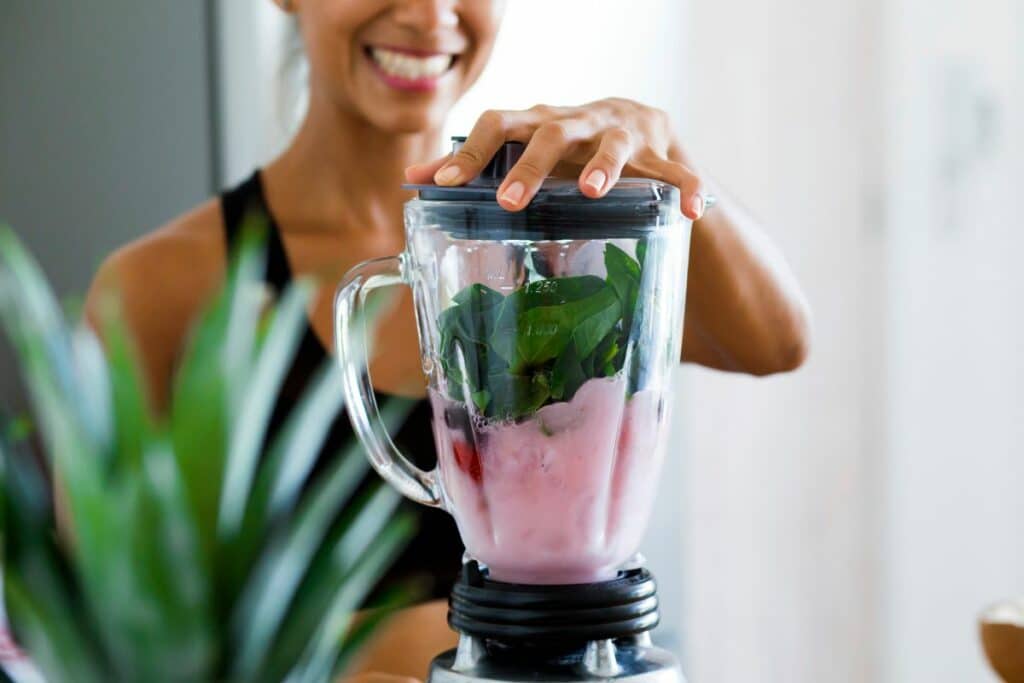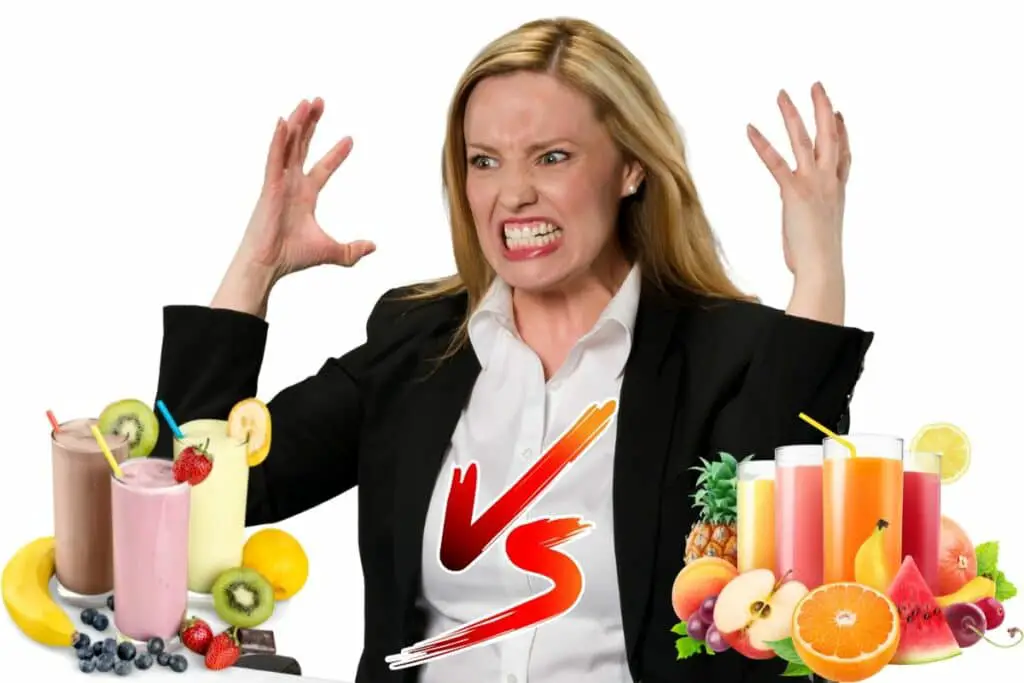Let’s explore the fascinating world of juices & smoothies, revealing the truth about their potential downsides and how they can sometimes deceive us into thinking they’re the ultimate healthy option.
If you’re like me, you probably enjoy a good smoothie. They’re tasty, refreshing, and seem like a quick and healthy choice. But have you ever wondered if there’s more to these colorful concoctions than meets the eye?
In our fast-paced world, it’s easy to be enticed by the promise of health in a glass. That’s why I wanted to share my thoughts with you.
The Pros and Cons of Fruit Juices & Smoothies
Here’s my vendetta against juices and smoothies.
They’re often disguised as these healthy saviors. When in fact they aren’t – well at least not as much as we believe.
I’m wary of these clever marketing tactics that are strategically meant to deceive us.
And don’t even get me started on fruit juices – because those are perhaps much worse.
And I’ll admit – I’m a lover of a tasty smoothie myself. But it’s high time we had an honest chat about the downsides of these seemingly virtuous drinks, while also shedding light on any potential perks that they bring to the table.
Read also: 21 Tips To Stay Motivated To Eating Healthy

Deceptive & Misleading Marketing of Juices & Smoothies
In a world where time is scarce, and meal-skipping has become commonplace, portable nutritious options have never been more enticing. Fruit juice and smoothies even masquerade as weight loss aids, all while flaunting their low-calorie credentials.
But we simply must not ignore the art of deception that often accompanies juices and smoothies.
Their vibrant colors and the enticing labels of “fresh” and “natural” have ensnared many a health-conscious soul.
So let’s unravel this illusion.
The Disadvantages of Juices & Smoothies
One of the biggest drawbacks of fruit juices and smoothies is their high sugar content.
An emerging body of research suggests that fruit juice can be as detrimental as sugary sodas.
At least with the soda you know you’re being unhealthy. But the fruit juice has you thinking you’re making the right choice when in fact it often isn’t
And it’s not only the sugars, fruit juice and smoothies are often packed with more calories that you expect. And, we all know that excessive sugar intake is linked to an increased risk of heart disease and stroke. In fact, some research suggests that drinking juice for breakfast might even contribute to obesity.
Read also: 8 Best Tips Based On My Journey With Intermittent Fasting

Let me ask you a question, what you do think is easier to digest an apple or apple juice?
Obviously, the apple juice right?
Liquid forms of fruit, like juice and blended smoothies, are easier and quicker for your digestive system to process.
This rapid digestion can result in a more immediate release of sugar into the bloodstream, causing a spike in blood sugar levels.
Sugar crash caused by fruit juices & smoothies
If you often feel moody or tired after eating sugar, it’s not in your head. Sugar causes a quick rise of serotonin levels.
This rise causes an energy-boosting spike, which can make you feel more awake and alert. However, this is only very short-lived.
So, after serotonin levels peak they quickly decrease, which causes you to feel irritable, moody, and lethargic.
Plus, too much sugar will cause our body to release insulin to help regulate the glucose levels.
If our body produces too much insulin in response to a sugar spike, it can cause our blood sugar levels to drop, leading to feelings of fatigue, weakness, and hunger.
This is commonly called “sugar crash.”
It is reported that these mood swings and cravings is the the same kind of cycle experienced by drug addicts.
But hold on, before you swear off fruit juice entirely, there is a silver lining.
Fruit juice isn’t all bad! It can provide vital nutrients, especially if you’re not eating enough whole fruits.
In fact, studies have shown that moderate consumption of 100% fruit juice, is associated with a lower risk of stroke, heart disease, and cognitive decline.
Read also: 16 Surprising Tips To Avoid Holiday Weight Gain

How much fruit juice should I consume daily?
Well, according to the article, you should aim for about 5 ounces per day which is roughly equivalent to about 140 mls.
So, the key here is moderation.
What should you use instead of fruit juice and smoothies?
Well the answer is simple really, opt for whole fruits instead.
Whole fruits are packed with dietary fiber tend to keep you feeling full for a longer period of time.
Plus, when you consume fruit in its whole form, the sugars are absorbed into your body at a slower and steadier rate.
I’m sure you’re wondering…which of the two is the healthier option – fruit juice or smoothies?
Read also: List Of The Best Foods To Eat For A Healthy Diet
Is fruit juice healthier than smoothies?
In general, smoothies are often considered healthier than fruit juice due to their retention of natural fiber.
You see, most smoothies – especially if you make them at home – have two parts, the juice and the pulp.
The pulp which is not included in juice has the fiber. Smoothies also typically contain a wider variety of nutrients as they incorporate both whole fruits and vegetables.
And the key word here is ‘typically.’

Plus, the fiber in smoothies helps you feel full faster, which aids in portion control.
It’s essential to note that not all fruit juices and smoothies are created equal.
Some are made with whole fruits, including the fiber, while others may include added sugars or syrups, which can further contribute to sugar spikes.
If you do enjoy fruit juice or smoothies, consider moderation and balancing them with other foods that have fiber and protein to help stabilize your blood sugar levels.
Plus homemade smoothies that incorporate the whole fruit is preferable.
Which do you prefer? Smoothies or juice -or both- let me know in the comments.
Final words on fruit juices and smoothies
This article in no way means that you need to give up on your favorite beverages. But it should make you realize that things are not often as healthy as they seem.
That everyday choices can have a negative impact on your overall wellness goals. Consider it a nudge to be more vigilant, to read labels.
References
Guasch-Ferré M, Hu FB. Are Fruit Juices Just as Unhealthy as Sugar-Sweetened Beverages? JAMA Netw Open. 2019;2(5):e193109.
Ruxton CHS, Myers M. Fruit Juices: Are They Helpful or Harmful? An Evidence Review. Nutrients. 2021 May 27;13(6):1815.








